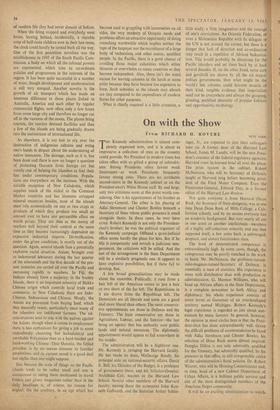On with the Show
From RICHARD H. ROVERE
NEW l'ORK
TnuKennedy administration is almost com- pletely organised now, and it is about as impressive a collection of men as the country could provide. No President in modern times has taken office with so gifted a group of subordin- ates. Strong Presidents often favour weak lieutenants—as weak Presidents frequently favour strong ones. There are no certifiable second-raters in the Kennedy cabinet or on the President-elect's White House staff. By and large, only two criticisms seem at this point worth con- sidering. One is his appointment of his brother as Attorney-General. The other is his placing of Adlai Stevenson and Chester Bowles beneath a Secretary of State whose public presence is small alongside theirs. In these cases, he may have erred. Robert Kennedy is not only the President- elect's brother; he was the political organiser of the Kennedy campaign. Offhand a quasi-judicial office seems hardly the place for him. But if he fills it competently and reveals a judicious tem- perament, the criticisms will be stilled. And the test of the arrangement in the State Department will be a similarly pragmatic one. It appears to have explosive possibilities, but if these fail to develop, fine.
A few broad generalisations may be made about the ensemble. Politically, it runs from a hair left of the American centre to just a hair or two short of the far left. The Republicans in it are drawn from the Republican left. The Democrats are all liberals and some are a good deal more liberal than others. The most conserva- tive appointments are those in Defence and the Treasury. The least conservative are those in Agriculture, Labour, and the Interior—the last being an agency that has authority over public lands and natural resources. The diplomatic appointments would appear to fall somewhere in the middle.
The administration will be a highbrow one. Mr. Kennedy is ravaging the Harvard faculty. He has made its dean, McGeorge Bundy, his principal aide on national-security affairs. David E. Bell, his Director of the Budget, is a professor of government there, and his Solicitor-General, Archibald Cox, teaches in the Harvard Law School. Several other members of the Harvard faculty, among them the economist John Ken- neth Galbraith, and the historian Arthur Schles- Inger, Jr., are expected to join their colleagues later on. A former dean of the Harvard Law School, James M. Landis, will be the new Presi- dent's overseer of the federal regulatory agencies. Harvard rears its learned head all over the place. The prize tycoon in the cabinet, Robert McNamara, who will be Secretary of Defence, taught at Harvard long before becoming presi- dent of the Ford Motor Company. Even the Postmaster-General, Edward Day, is a former editor of the Harvard Law Review.
Not quite everyone is from Harvard (Dean Rusk, the Secretary of State-designate, was at one time Dean Dean Rusk of Mills College, a Cali- fornian school), and by no means everyone has an academic background. But very nearly all are in one sense or another intellectuals—members of a highly self-conscious minority and one that supposed itself, a few years back, a submerged, despised, and almost functionless class.
The level of demonstrated competence is extraordinarily high. In some case's, though, the competence may be poorly matched to the work in hand. Mr. McNamara, the professor-turned- auto-magnate-turned-Secretary of Defence, is essentially a man of statistics. His experience is more with distribution than with production or administration. G. Mennen Williams, who will head up African affairs in the State Department, is a complete newcomer to both Africa and diplomacy; his whole experience consists of seven terms as Governor of an overdeveloped territory named Michigan. Robert .Kennedy's legal experience is regarded as just about non- existent by many lawyers. In general, however, the opinion in most circles here is that the Presi- dent-elect has done extraordinarily well. Given the difficult problems of accommodation he faced with Adlai Stevenson and Chester Bowles, his selection of Dean Rusk seems almost inspired. Douglas Dillon is not only admirably qualified for the Treasury, but admirably qualified, by his presence in that office, to still irresponsible critics of the administration's fiscal policies. Dr. Robert Weaver, who will be Housing Commissioner and, in time, head of a new Cabinet Department of Urban Affairs, is a brilliant public servant and one of the most distinguished members of the American Negro community.
It will be an exciting administration to watch.


































 Previous page
Previous page